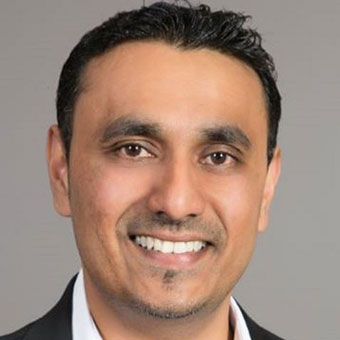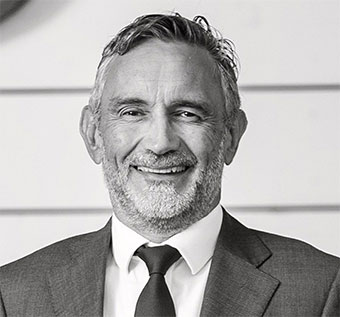The Economic Power of Gender Equality
Reasearch shows that diversity and equal roles for women delivers better results for people, for the planet and for profits.
Amit Prasad and Mark Tume discuss the value of the Mentoring for Diversity programme to them.
 Amit Prasad
Amit PrasadAmit Prasad spent 25 years in the finance sector as a chartered accountant and in senior roles for large organisations, most recently as CFO for the Diocese of Auckland. He has 10 years’ experience in governance roles and most of these are in not for profits. He is currently on the board of St John New Zealand and the Museum of Transport and Technology (MOTAT) and chairs the audit and risk committees for both.
“The Mentoring for Diversity Programme exceeded all my expectations,” says Amit. “It was excellent, very well organised and structured and the focus on matching the mentor to the mentee was very important. I think that it makes all the difference to how you bond with your mentor and the value you get from the programme. I could not have asked for anyone better than Mark.”
Amit says a key outcome he was seeking from the MFD programme was to learn how he could bring his lived experience and capability to the board environment.
“I found we had similar values in many respects. Mark is from a Māori background. I am Indian by descent, brought up in Fiji and am now a citizen of New Zealand.
“I come from humble beginnings. At the age of nine I started working to support my financial situation and my education. So all those experiences compound in my ways of thinking in terms of how different perspectives wrap up in a strategy dialogue.
“To learn from an experienced director, the value of that lived experience was important to me. Mark was very open and frank about what happens around the board environment and the value I got from his insights was gold.
“To anyone planning to do the programme, I’d say, please do not underestimate the degree of effort the mentor puts in. I have mentored people on their accounting journeys and you can get taken for granted. It is important to recognise the mentor is putting their valuable time in for your benefit.”
Amit’s governance journey began with volunteering as an ESOL home tutor for the English Language Partners (ELP) not-for-profit (NFP) organisation.
“That led to me being invited to join the ethnic advisory group and ultimately the ELP board. I have spent quite a lot of time on NFP boards since then and in December 2021 I left my professional role to focus on governance and having flexibility on spending time with whanau taking precedence over a full time high demanding professional finance role.”
Mark and Amit structured their discussions around Amit bringing several questions to each about a challenge in the board environment.
“We would discuss that at length to see what solution we would come up with. That worked very well and I got a lot out of Mark’s insights, way of looking at things at a board level, and his perspectives from a diversity angle.”
“I wanted to know, how might I actually change the perspective of an individual or an organisation. If you bring a lived experience to a board, you bring an evidence-based approach to an issue.
“For example, environmental, social and governance (ESG) criteria is at the forefront for most boards. I have lived off the land in an area without sanitation. I have washed my clothes in the river and bathed in the river and have personally learned the value of why you look after the land – so the land can look after you.
“A board can look at ESG in terms of the theory and research but that lived experience brings a different viewpoint. The same goes for bringing experience from a migrant, ethnic minority and a Pasifika perspective.
“New Zealand is a very ethnically-diverse country. How does a board cover all of its shareholder and customer perspectives and take into account how individuals will react to certain decisions? Having a board with a diverse background enables you view decision-making through a different lens.
“I take my hat off to the organisations that are embracing the journey of change to really support all kinds of diversity on boards. A lot of it is about education and advocacy and making sure we have the right interest levels to move from tokenism to practical solutions around how you practice diversity at board level and bring in those other views.”
 Mark Tume
Mark TumeMark Tume has 20 years’ experience as an independent director. He joined the Infratil board as an independent director in November 2007 and has been Chairman since October 2013. He is Chair of Te Atiawa Iwi Holdings and a director of RetireAustralia and Precinct Properties. His professional experience has been in New Zealand banking and funds management.
“I enjoyed mentoring Amit,” says Mark. “I got a lot out of it too – it was a two-way street. I am frequently offshore so don’t get to attend many IoD functions but I still want to be connected and put something positive back. This was something I could organise in terms of personal time and fit around my diary.”
When Mark took on his first independent director role, with Transpower, 20 years ago, he undertook a short IoD programme.
“It was a truncated three-day course and I found it extremely useful. It can be hard when you are starting out and you may find it hard to ask certain questions of other board members.
“Those were the kind of questions Amit was able to ask me and there were some issues he just wanted confirmation on. When I first started out as an independent director, it would have been good to have someone to bounce ideas off like that.”
Mark says he has seen boards become steadily more diverse.
“I take my hat off to the state-owned enterprises (SoEs) in the late 90’s and early 2000’s that recognised New Zealand had a small pool of experienced independent directors and therefore opened up opportunities through appointments to SOE boards, diversity by design, allowing more people to consider governance as an option. Over 20 years I have seen that initiative deliver a larger, more diverse group of experienced directors.
“I should make the point, diversity is only one factor in achieving good decisions. Directors must have the courage to express a view, or you can end up with diversity in name only. There are a number of factors that go into successful boards directors must not only have courage, but also capacity, and need to care about the business they are governing.”
“The great thing about mentoring Amit is it made me reflect on my own journey over the past 20 years, which was as instructive to me as I hope it was to him.”
Find out more about the Mentoring for Diversity programmme